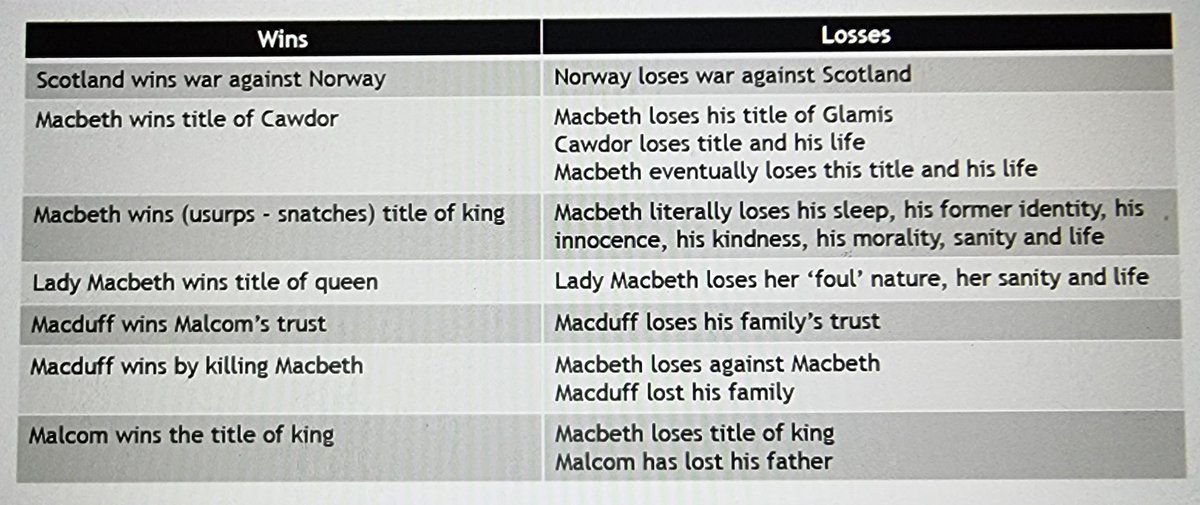A thread on on paradoxes in Macbeth
A paradox is a statement which appears self-contradictory, but when examined closer turns out to be true.
Paradoxes expose how the lines between what is true and untrue are arbitrary. However, those trapped within them rarely realise this. 1/
A paradox is a statement which appears self-contradictory, but when examined closer turns out to be true.
Paradoxes expose how the lines between what is true and untrue are arbitrary. However, those trapped within them rarely realise this. 1/
The witches are arguably the most paradoxical characters in the play: they are supernatural, yet live in the natural world; they do not lie, yet do not tell the truth either; they & #39;should be women& #39;, & #39;yet [their] beards forbid [us] to interpret that they are so& #39;. 2/
It& #39;s fitting then that they& #39;re the first characters we meet. Their paradoxical existence sets the tone of the play by confirming how all thresholds are interconnected. The impact is heightened for Jacobeans since their belief in witches blurrs fiction with reality. 3/
In 1.1 the 2nd Witch introduces the first, and arguably central, paradox of the play: & #39;when the battles lost and won& #39;. This is then echoed by Duncan in 1.2 when he says: & #39;what he hath lost noble Macbeth hath won& #39;. 4/
Literally, the 2nd witch is saying they will meet again when the war between Scotland and Norway is over. However, the lack of specificity foreshadows how the play will be characterised by several literal and metaphorical battles - with every win there will be a loss. 5/
The paradox of wins and losses reveals how the boundaries between the two are blurred and both will always co-occur. This is just as applicable to other themes like loyalty, morality and leadership. It becomes a universal truth for both the characters and audience. 6/
Indeed, in pursuit of victory, the characters often ignore the losses that they and their communities/families experience. Thus, the play forces audiences to question which battles are worth fighting. 7/
Interestingly, this paradox about winning and losing is echoed by Duncan in 1.2: & #39;what he hath lost noble Macbeth hath won& #39;. The paralellism connects Duncan to the witches, proving that their fates are interwined - they are all trapped within this paradox 8/
Duncan& #39;s line literally means that Macbeth will assume the title of Cawdor as a reward for his loyalty and punishment for the former Thane& #39;s disloyalty - showing once again that both are interdependent. 9/
However, Macbeth will not only inherit the former thane& #39;s title but also his character and fate. This raises questions about whether he was enacting a self-fulfilling prophecy unknowingly trigerred by Duncan or a supernatural one. Either way, his win comes with personal loss. 10/
The paradox and paralellism between the Cawdors also results in proleptic irony and the play develops a cyclical structure. This collectively symbolises the tragic fact that actions always have consequences and one cannot escape their fate. 11/
Ultimately, the paradox of wins and losses confirm that there is no winning without losing; sacrifices have to be made for the & #39;greater good& #39;; illegitimate wins only provide temporary victories and lead to greater losses over time. 12/
It also raises questions about how astute less paradoxical characters are. E.g. Duncan is gracious, but flawed. He prudently punishes Cawdor, but ignorantly trusts Macbeth. He also arguably sets into motion a self-fulfilling prophecy which leads to his and Macbeth& #39;s death. 13/
Banquo also is a morally ambiguous and somewhat paradoxical character. He suspects Macbeth but does very little to prevent him from killing the king - perhaps because his inaction is required for the actualisation of his own prophecy... 14/
Macduff likewise sacrifices the safety of his family in pursuit of securing the safety of Scotland. His choice confirms the existence of the paradox, whilst educating the audience on the worthiness of it. 15/

 Read on Twitter
Read on Twitter


